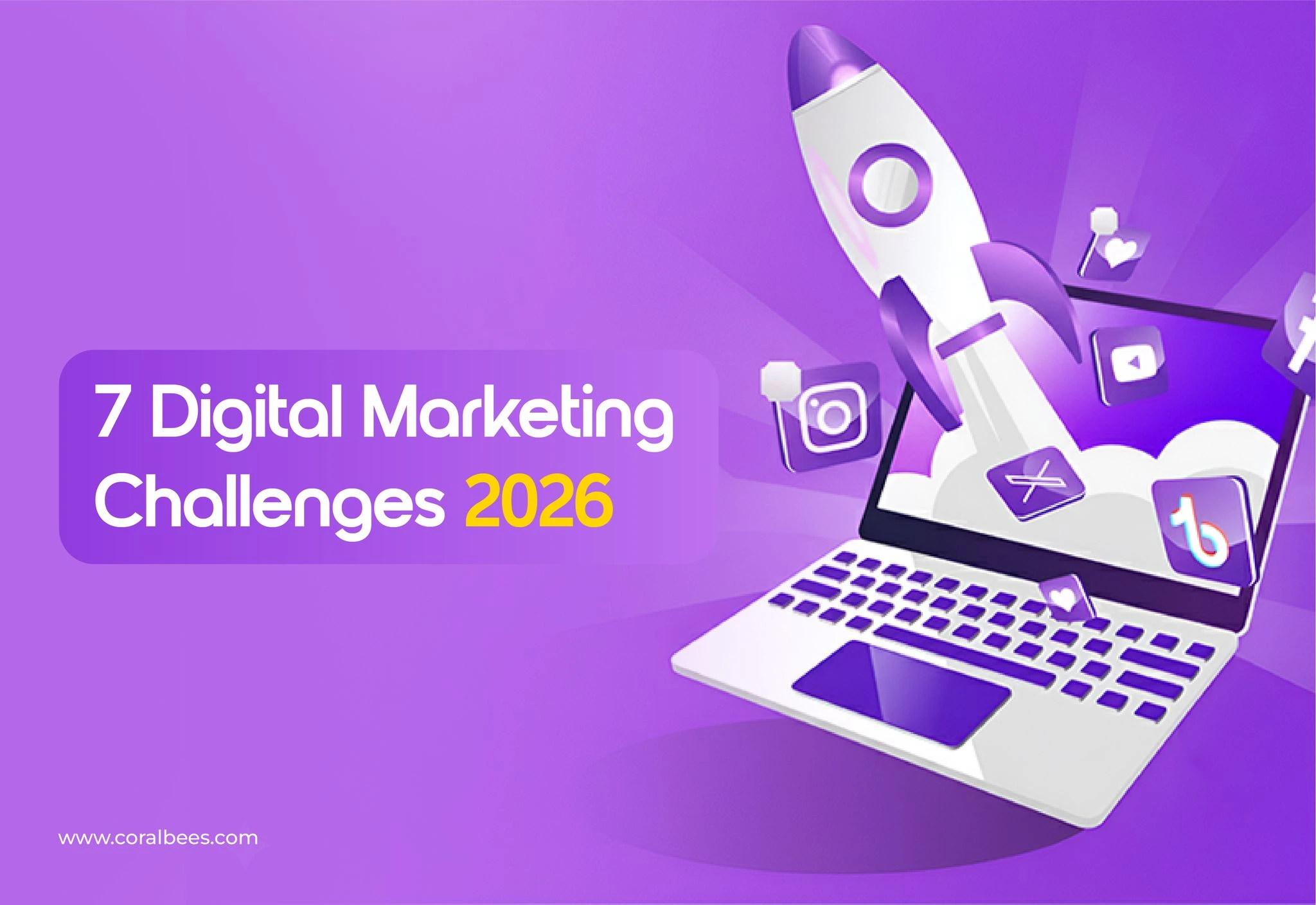The year 2026 will bring significant digital marketing challenges that brands must prepare for. While the upcoming year promises undeniable digital marketing opportunities and challenges for marketers and businesses, accelerated AI adoption and stricter privacy regulations will reshape how brands connect with customers.
The focus is shifting beyond clicks and impressions toward building genuine engagement in a more complex digital landscape. As technology evolves, consumer expectations will rise, and compliance demands will intensify. In this dynamic environment, adaptability and alertness will be key traits for brand success.
Here are seven major digital marketing challenges businesses should anticipate in 2026, along with practical strategies to stay ahead.
Key Takeaways
- AI makes marketing smarter but less personal.
- Customer focus remains key to success.
- Consistent, relevant content drives engagement.
- Data privacy rules demand transparency.
- Brand consistency builds audience trust.
- Smart Martech use saves time and effort
- Mobile friendly, omnichannel strategies win reach.
1. Staying Customer-Centric in an AI-Driven Era
Artificial intelligence is now central to marketing. However, relying entirely on AI, or only on human effort, will not work in 2026 and beyond. The real challenge lies in staying customer-centric in an AI-driven era. AI indeed creates content, tracks customer data, and improves personalization in real-time. Still, it cannot replace human understanding and emotional connection. Brands must strike a balance where AI enhances human abilities, keeping marketing personal while boosting efficiency. Companies that master this balance will stand out. Partnering with the right brand and digital agency that uses AI-driven insights while maintaining genuine audience connections will make achieving this balance much easier.
2. Creating Relevant & Engaging Content Across Channels
With the rise of short videos, micro-content, and interactive posts, how people consume information has changed. Since audiences get bored quickly, marketers must create relevant content that not only fits different social media platforms but also keeps their target audience hooked and resonates. The struggle to create content that aligns with their digital marketing strategy while staying original has never been so real. Focusing on storytelling, creativity, and creating high-quality, value-driven, and mobile-friendly content ensures your message engages users across every device they use and holds their attention longer. Moreover, it is the key to creating a strong and loyal customer base.
3. Managing Data Privacy & Evolving Regulations
Consumers are becoming more aware of how their information is collected and used, especially in an era of digital fraud. Governments are tightening regulations to protect user data and prevent scams, which directly affects how businesses manage marketing campaigns. The challenge is to remain transparent and compliant while still gathering insights that improve engagement. Here, companies must handle customer data responsibly and keep their audiences informed. For small firms learning the basics, this guide on why digital marketing is important for small businesses can help them adopt safer and smarter practices.
4. Maintaining Brand Consistency Across Touchpoints
Customers will be active on different social media platforms. So, they are more likely to interact with a brand more often, and they expect the same tone and quality everywhere. Most businesses struggle to maintain a consistent message across emails, websites, social media marketing, and ads. Inconsistent branding can confuse audiences and eventually reduce trust. This greater marketing challenge can be resolved by building a unified content plan and setting clear brand guidelines. Just like we have discussed in this list of the Top 7 digital marketing agencies in Kerala, maintaining brand consistency is key to long-term success.

5. The Omnichannel Balancing Act
Today, customers switch between online stores, shopping apps, and social media on every mobile device before deciding to purchase things. Managing all these multiple touchpoints clearly is a common challenge faced by digital marketing teams and companies. Omnichannel marketing means giving a consistent experience across all these platforms, since just being present everywhere is not enough. Businesses also need to track results in real time and make sure all content matches their goals. However, for smaller teams, limited time and resources make this marketing challenge even harder.
6. Leveraging Martech Without Overcomplication
The current marketing technology offers hundreds of tools for analytics, content scheduling, and automation for marketers. However, too many platforms can lead to confusion instead of productivity improvements. Besides, choosing the right mix of marketing technology is one of the biggest challenges of digital marketing in India and across the globe. Here, the goal should be to simplify workflows and support effective decision-making, not to overload teams. Businesses that face this confusion can learn efficient practices by studying the strategies used by the best digital marketing agency in Calicut, Kerala.
7. Competing for Attention in a Crowded Market
With millions of businesses online, getting noticed is harder than ever. Audiences are flooded with ads and promotions daily, making their attention the most valuable asset. The challenge brands now face is to stand out through originality, useful insights, and emotional connection. Experimenting with effective strategies is currently being followed to drive engagement without losing authenticity. The digital world is competitive and never-endingly evolving. Brands must understand the challenges and opportunities of digital marketing to stand out and engage their audience effectively. Focusing on audience needs, experimenting with new content types, and improving digital marketing efforts are traits businesses should embrace to stay ahead.
Bottom Line
The challenges of digital marketing in 2026 go beyond evolving tools and trends. Understanding people, creating meaningful connections, and using technology wisely are key in the AI-driven era. For brands, success will depend on how well they manage innovation, data, and consistency while building genuine relationships. Businesses that stay adaptive and audience-focused will step on these digital marketing challenges and turn them into growth opportunities.
FAQ
- What are digital marketing challenges?
They are obstacles businesses face while promoting products or services online, such as maintaining engagement, data privacy, or brand consistency. - Why do businesses face challenges in digital marketing?
Businesses face these challenges faced by digital marketing because the online landscape changes rapidly, with new platforms, algorithms, and audience expectations emerging constantly. - How can companies overcome digital marketing obstacles?
By planning carefully, setting clear goals, and focusing on audience needs instead of trends. - What is the role of customer behavior in digital marketing challenges?
Understanding customer behavior helps marketers personalize their approach and deliver relevant experiences. - How does content impact digital marketing success?
High-quality, engaging content improves visibility and trust, leading to better performance in campaigns. - Why is brand consistency important across channels?
Consistency strengthens brand recognition and ensures that customers have a reliable experience everywhere. - What is omnichannel marketing, and why is it important?
It connects all customer touchpoints into a smooth experience, improving satisfaction and loyalty. - How do data privacy regulations affect digital marketing?
They limit how businesses can collect and use customer data, making transparency essential. - What strategies can improve marketing efficiency?
Using automation wisely, setting priorities, and tracking progress through analytics. - How is technology shaping the future of digital marketing?
Technology makes marketing more targeted and efficient, but requires human insight to keep it meaningful.








